Death, taxes … and presbyopia? One of the few certainties in life, presbyopia is an inevitable part of the natural aging process. Although tools to mitigate the effects of presbyopia are accessible (but seemingly always disappearing [ahem, readers]), several companies are working to develop pharmaceutical solutions to address the condition. This article overviews some products in development.
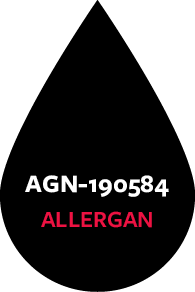
AGN-190584 (Allergan) is a 1.25% pilocarpine formulation for the treatment of symptoms associated with presbyopia. Allergan completed phase 3 investigations and announced submission of its New Drug Application for AGN-190584 for the treatment of presbyopia in February 2021.
In the phase 3 GEMINI 1 and 2 studies, a total of 750 patients with presbyopia were randomly assigned to receive either AGN-190584 or placebo once daily for 30 days. The primary efficacy endpoint was met in both studies, with AGN-190584 demonstrating significant near vision gains in mesopic conditions without a loss of distance vision.1 The company reported that the majority of secondary endpoints were also met, including a significant improvement in patient-reported outcome measures, such as an increase in vision-related reading ability and reductions in the impact of presbyopia on daily life. No treatment-emergent serious adverse events were observed in either study, according to Allergan.
Follow along on Twitter @allerganeye
1. Allergan, an AbbVie company, announces positive phase 3 topline results for investigational AGN-190584 for the treatment of presbyopia [news release]. Allergan. October 28, 2020. Accessed July 1, 2021. https://news.abbvie.com/news/press-releases/news-type/rd-news/allergan-an-abbvie-company-announces-positive-phase-3-topline-results-for-investigational-agn-190584-for-treatment-presbyopia.htm
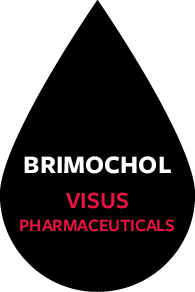
Brimochol (Visus Therapeutics) is a proprietary pupil-modulating eye drop that contains two FDA-approved pharmaceuticals: carbachol (a cholinergic agent) and brimonidine tartrate (an alpha-2 agonist). When combined, these agents produce a pinhole effect to reduce pupil size so that only centrally focused light rays enter the eye, thereby sharpening distant and near images.
According to Visus,1 the Brimochol combination eye drop has been studied in more than 200 patients and six clinical studies to date. These studies have demonstrated an average near visual acuity improvement of 5 lines or more, with a duration of a minimum of 8 hours post dose, the company reported. Two formulations, Brimochol and Brimochol-F, are currently under investigation in phase 2 clinical trials.
Follow along on Twitter @visustx
1. Visus Therapeutics. Accessed August 1, 2021. https://www.visustx.com/brimochol
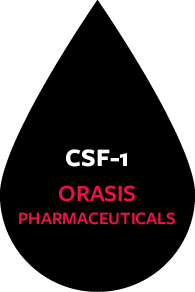
CSF-1 (Orasis Pharmaceuticals) is a parasympathomimetic agent combined with a nonsteroidal antiinflammatory drug in an oil-based vehicle that adds to the comfort of the drop. The active ingredient is a low-dose pupillary miotic, and the agent is designed to be administered binocularly.
CSF-1 is currently being tested in two phase 3 studies, NEAR-1 and NEAR-2, following successful phase 2b study results. In the phase 2b study, CSF-1 showed exceptional near visual acuity, with no reduction in distance or night vision, the company said. The study also met its primary endpoint of a 3-line improvement in near vision.
Follow along on Twitter @orasispharma
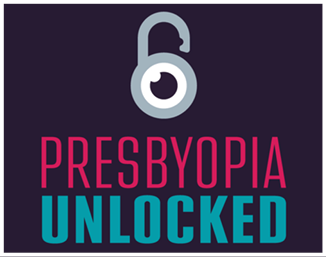
Looking to learn more about presbyopia? Check out the Presbyopia Unlocked podcast on Eyetube. On the most recent episode, David A. Goldman, MD; Selina McGee, OD, FAAO; and David Geffen, OD, discuss what they call in-between patients, or individuals with mild presbyopia who are not yet completely frustrated with their vision. Listen here!
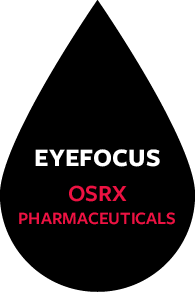
EyeFocus (OSRX Pharmaceuticals) is a binocular presbyopia-correcting drop that is a compounded combination of medications including pilocarpine, phenylephrine, pheniramine, and ketorolac. The drops work by constricting the pupil and improving accommodation at the ciliary body. EyeFocus contains 0.302% pilocarpine HCl and EyeFocus+ contains 0.604% pilocarpine HCl.
In a small proof-of-concept study,1 nine patients with presbyopia received one drop of the medication in each eye at hour 1 and then another drop at hour 5. In these patients, near vision improved by an average of 3 lines. At hour 1, 66% of patients could read at least 20/40. During hours 3 to 5, reading vision was 20/40 in 89% of patients and 20/30 in 66% to 71% of patients. A total of 78% of patients maintained 20/40 vision for 8 hours [data on file, OSRX Pharmaceuticals].
1. Rowen S. Pharmacologic solutions to presbyopia. MillennialEYE. March/April 2020. Accessed August 1, 2021. https://millennialeye.com/articles/mar-apr-20/pharmacologic-solutions-to-presbyopia/
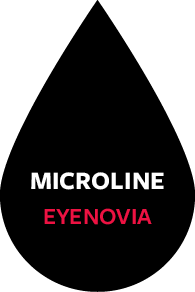
MicroLine (Eyenovia) is a proprietary pilocarpine formulation for the treatment of presbyopia that utilizes the company’s Optejet dispenser. Optejet administers one-fifth the volume of solution compared with traditional eye droppers, eliminating overdosing and reducing systemic exposure and toxicity, according to Eyenovia.
In May, Eyenovia announced that its VISION-1 study evaluating MicroLine for the temporary improvement of near vision in adults with presbyopia achieved its primary endpoint. The VISION-1 study evaluated the safety and efficacy of Eyenovia’s 1% and 2% pilocarpine Micro-Array Print formulations versus placebo, all administered via the Optejet dispenser. Preparations are underway for a second phase 3 registration study, VISION-2. These studies will serve as the basis for a planned New Drug Application (NDA) submission to FDA.
Follow along on Twitter @eyenovia
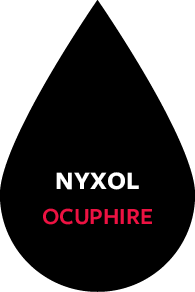
Nyxol (Ocuphire) is a preservative-free ophthalmic solution containing 0.75% phentolamine (or 1% phentolamine mesylate), a nonselective alpha-adrenergic antagonist that inhibits the contraction of the iris dilator muscle. Nyxol is being developed for dim or night vision disturbances, reversal of pharmacologically induced mydriasis, and presbyopia.
In multiple phase 2 trials, Nyxol reduced pupil diameter, resulting in better contrast sensitivity and visual acuity, according to Ocuphire.1 In June, the company reported that the phase 2 VEGA-1 study evaluating Nyxol in combination with low-dose pilocarpine in presbyopic eyes successfully met its primary endpoint, with 61% of patients treated with Nyxol and low-dose pilocarpine improving by 15 letters or more (≥ 3 lines) in photopic binocular near vision at 1 hour compared with 28% of placebo patients. Several secondary endpoints were also met, the company said.
Follow along on Twitter @ocuphire
1. Ocuphire Pharma. Accessed August 1, 2021. www.ocuphire.com
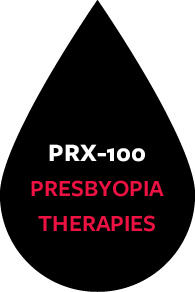
PRX-100 (Presbyopia Therapies) is a pharmaceutical agent designed to induce a reversible pupil miosis that should improve near vision through increased depth of focus. This drop’s active ingredient is aceclidine, and it is meant to be used binocularly. According to Presbyopia Therapies, PRX-100 will have a 30-minute onset of action and will last approximately 4 hours. The company states that the drop will affect only the pupillary sphincter muscle, sparing the ciliary muscle and having no effect on accommodation, thereby preserving stable distance vision.1
In 2018, Presbyopia Therapies completed a small phase 2b study, in which PRX-100 demonstrated at least a 3-line improvement in monocular distance-corrected near visual acuity (DCNVA). The randomized, double-masked study included 58 patients who received either PRX-100 or placebo. At 1 hour after treatment with PRX-100, 47.2% of patients gained at least 3 lines and 91.7% gained at least 2 lines of improvement in near vision. The company was expecting to enter phase 3 clinical trials this past year.
1. Davidson J, Kimbro P. Coming soon: presbyopia-correcting eye drops. Modern Optometry. September 2020. Accessed August 1, 2021. https://modernod.com/articles/2020-sept/coming-soon-presbyopia-correcting-eye-drops?c4src=article
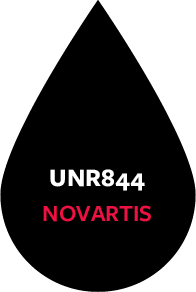
UNR844 (lipoic acid choline ester [LACE] 1.5%; Novartis) works directly on the flexibility and accommodative ability of the crystalline lens. Previously called EV06, UNR844 is designed to penetrate the cornea and break down into lipoic acid and choline. Lipoic acid is hydrolyzed by esterase in the tear film and cornea and subsequently reduced into dihydrolipoic acid within the fiber cells of the crystalline lens, which causes hydrolysis of the disulfide protein bonds. Cytosol regains the ability to flow freely, and the oxidative process may be reversed, thereby restoring the lens’ elasticity and accommodative amplitude by allowing the lens to change shape.
In a phase 1/2 study of EV06 ophthalmic solution 1.5%, 50 patients received one drop of the drug twice daily and 25 patients received placebo.1 By day 91, DCNVA was 20/40 in 82% of patients treated with EV06 and 48% of patients who received a placebo compared to baseline values of 30% and 28%, respectively. DCNVA was 20/32 in 68% of patients treated with EV06 and 28% of patients who received a placebo compared to baseline values of 8% for both groups. Additionally, 22% of patients experienced an improvement of 3 lines after 90 consecutive days of twice-daily treatment.
Follow along on Twitter @novartis
1. Rowen S. Pharmacologic solutions to presbyopia. MillennialEYE. March/April 2020. Accessed August 1, 2021. https://millennialeye.com/articles/mar-apr-20/pharmacologic-solutions-to-presbyopia/


